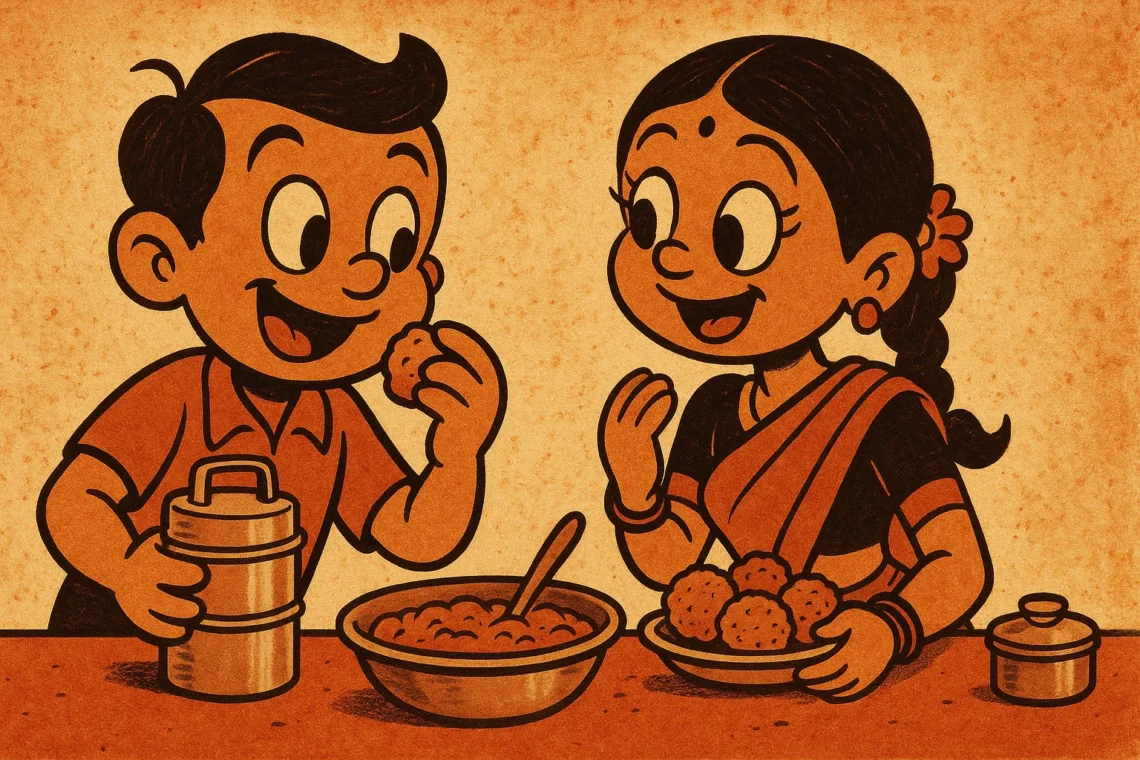In a classroom full of mismatched lunch bags and impatient rumbling stomachs, you always knew the bell was about to ring when the smell of someone else’s lunch started drifting across the room. It didn’t even have to be open yet—just the warmth, the spice, the ghost of ghee escaping a slightly loose lid. And sometimes, when I opened my own lunchbox, it didn’t smell like home. It smelled like someone else’s.
It was confusing. The roti was there. The sabzi was familiar enough. But the scent was off—like it had borrowed someone else’s kitchen. Maybe it was the hing my aunt used instead of the usual mustard seeds. Or the fact that Mom had swapped lauki for tinda without warning. Maybe she was experimenting with a neighbor’s sambhar recipe. But as soon as I opened the dabba, I knew: this wasn’t mine. Not really. It was someone else’s lunch that had taken a wrong turn and ended up in my tiffin.
The Smell of Belonging
Food doesn’t just fill you—it anchors you. And smell? That’s the fastest way back to familiarity. My lunch usually smelled like our kitchen: cumin warmed in oil, coriander crushed by hand, rice still clinging to steam. I could identify our sabzi blindfolded. I knew the scent of my mom’s dal from two benches away. So when the smell changed, I noticed. Deeply. Unsettlingly. I opened the lid and didn’t feel hungry—I felt slightly displaced.
It wasn’t that the food was bad. It just didn’t feel like it belonged to me. I took a bite and it tasted fine—maybe even delicious. But it didn’t taste like home. It tasted like someone else’s mother had cooked it. With different hands. With a different understanding of how much jeera is too much. With a tadka that didn’t sizzle quite the way I liked.
The Quiet Mystery of the Substituted Meal
Later, at home, I’d ask my mom, cautiously: “Did you do something different with the sabzi today?” She’d shrug. “Just tried a new spice mix your masi gave me.” Or, “Bartan khatam ho gaye the, doosre wale dabbe mein daal diya.” And just like that, the mystery would be solved. Sometimes, the strangeness wasn’t even in the food. It was in the dabba itself—a different shape, a different lid, an unfamiliar smell soaked into the steel from someone else’s storage. Because dabbas carry memory too. And if it wasn’t mine, I knew it immediately.
But there were also days when my lunch smelled like something I wished I had. Like my friend Ayesha’s chicken curry, rich and peppery, with oil that made the rice glisten. Or Rahul’s paratha that was stuffed with something warm and herby that he never shared. I’d open my own tiffin and feel… betrayed. My food felt too simple. Too mild. Too much like boiled childhood. On those days, I’d barter. Trade two pieces of bhindi for one chunk of paneer. Pretend not to care when someone called my lunch “too healthy.” And occasionally—very occasionally—I’d leave the last bite uneaten, just because it didn’t feel worth finishing.
Finding My Flavor Again
Years later, in a shared office kitchen in Austin, I opened a microwaved lunchbox of leftover khichdi and froze. It smelled like someone else’s lunch again. Except now, I knew why—it was missing home. Not a different spice. Not a new experiment. Just distance. The rice had stiffened. The ghee had faded. There was no coriander leaf on top. It was mine. But it didn’t feel like it.
So I did what I had seen my mom do a thousand times. I warmed it again, added a tiny spoon of homemade ghee from a jar a friend had smuggled back from India, and stirred it till the smell came back. That slow, soft, warm scent that said, “You’re here now. You can eat.”
More Than a Meal
Our lunchboxes were always more than food. They were tiny declarations of identity. They said who you were, what you missed, who cooked for you, how much care you received that morning while half-asleep. So when your lunchbox smells like someone else’s, it’s not just a sensory surprise—it’s a small dislocation. A reminder of how rooted we are in the things that travel with us, wrapped in foil and packed in steel.
But sometimes, someone else’s lunch becomes yours too. You fall in love with a different style of sabzi. You adopt a new masala. You make peace with change. And one day, years later, your own child might open their lunchbox and say, “This doesn’t smell like yours.” And you’ll smile, knowing that smell is just another way we learn what home tastes like—and how it changes, slightly, lovingly, over time.
Born in Mumbai, now stir-frying feelings in Texas. Writes about food, memory, and the messy magic in between — mostly to stay hungry, sometimes just to stay sane.












